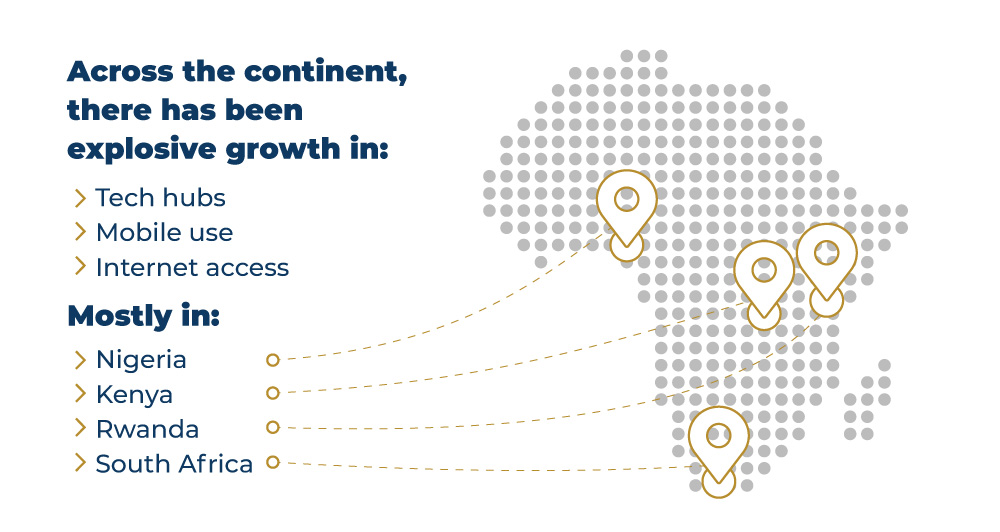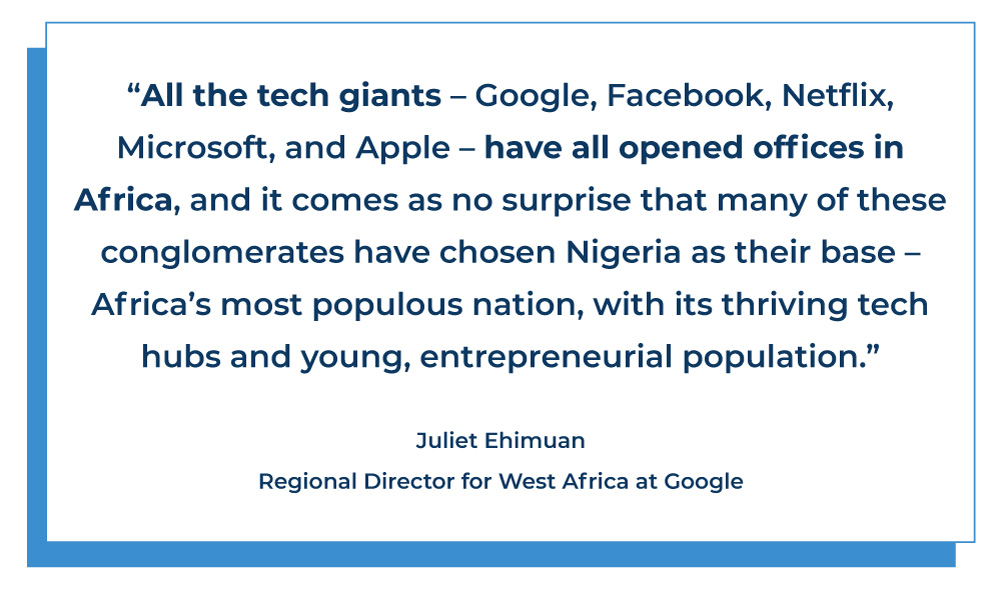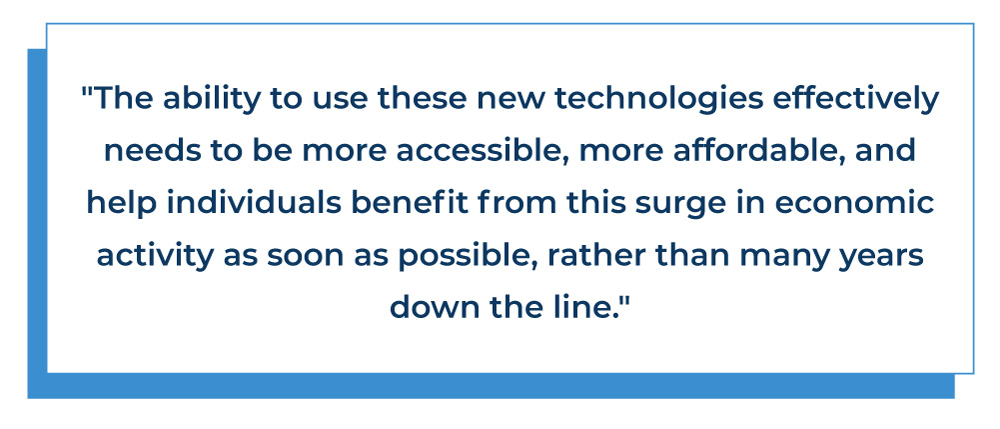Forget outdated stereotypes of the “Dark Continent”. In recent years, Africa has become a blazing beacon of Silicon Valley replicas, bustling tech hubs, and explosive digital growth.
There’s no doubt that Africa’s future is bright, given its rapid digital development in the past decade. But how much promise does Africa hold as a future international tech hub? What are the challenges that stand in the way of that dream? And what should our societies, governments, schools, and development agencies be focusing on to maximise this potentially multi-billion-dollar promise of growth?
In this article, we’ll take a look at Africa’s status as a new home for some of the world’s biggest tech companies, its significant improvements in availability and access to tech, and the biggest challenges that our continent needs to address to ensure its brightest future.
Africa’s promising rapid tech growth
Africa’s many problems are widely known: barely a week goes by where headlines don’t draw attention to the civil unrest, regional instability, famine, economic downturn, and poverty that affects swathes of the continent.
However, behind the media doom and gloom is a surge of heavy investment and economic refocus that is at the heart of Africa’s rise in the tech space. In the past decade, Africa has made tremendous progress across a range of sectors that serve as the foundation of its new-found international tech hub status.

Rwanda is among the leaders in fast-growing ICT development. Today, the country’s internet penetration stands at over 52.1%, compared with a dismal 7% in 2011, while mobile phone penetration has grown to over 80.6% from 33% in 2010, according to the nation’s Ministry of ICT and Innovation.
Kenya is no different: active internet and data subscriptions totaled 42.2 million in 2018, while broadband covers more than 45% of the population, according to official figures. Meanwhile, in Nigeria, phone access grew from just 200,000 subscribers in 1999 to 133 million in 2020, and teledensity went from 63% to 107% in just the last decade.
These are trends we’re seeing across the continent. Reports show nearly half a billion people now subscribe to mobile services in sub-Saharan Africa, with more than 272 million Africans now connected to the internet on their phones. In fact, from 1999 to 2004, Africa was the world’s fastest-growing mobile phone market: subscribers jumped from 7.5 million to 76.8 million in that period, an annual growth rate of 58%.
The rapid proliferation of connectivity on the African continent is a driving force for its wide scale digitisation. Today, much investment and economic interest and activity has been put into African states, resulting in an extraordinary growth of tech hubs- places where coders, web developers, graphic designers, hackers, and entrepreneurs can come together to create new digital products and set up businesses, all championed by young people. According to African investment firm Africa Prudential, these hubs have directly led to NGOs, venture capitalists, investors, donors, and technology providers all over the world looking to explore and tap into the vast human capital in the African market.

Diversity, inclusion, and the African perspective
This new foundation of tech ubiquity and access means that Africa will have advanced technological and technical capabilities to solve its many pervasive issues.
However, as Affrica builds these hubs and repositories of technological excellence, there will be an increased need to ensure that diversity and inclusion are the very soul of these initiatives. Diversity and inclusion have always been seen as a powerful way to drive more efficient, innovative solutions, by drawing on the wide experiences and backgrounds of many different people; Africa is no different.
A focus on diversity would avoid the many issues that arise from simply importing European, Asian, or American perspectives and solutions for an entirely different African context of wholly different problems. At the most basic level, Africa’s people are best aware of the problems they need to address, and so to exclude them from these discussions would be to waste time, energy, limited resources, and risk misdiagnosing (or outright exacerbating) the biggest issues.
The promise and potential of Africa’s youth
Accessibility and inclusion are no good if they don’t include Africa’s young talent (and their fresh, on-the-ground perspectives of Africa’s issues). In Africa, nearly 60% of the continent’s population are below the age of 30, and they are a central, critical part of what has made the continent a ‘darling’ of the tech world.
Inclusion of the youth will also help to solve a serious issue plaguing Africa’s development: youth unemployment. In South Africa alone, youth unemployment stands at a staggering 46%. This demonstrates that modernisation and digitisation of the continent will do nothing for her people if they’re left behind by a system that doesn’t prepare them to be a part of that growth.
However, it’s not simply enough to give these people jobs, especially with the threat of automation to low-skill, low-education labour. Africa’s tech future needs a new system of education that focuses on skills development and job-readiness, in a way that’s accessible, affordable, and time-sensitive. After all, if Africa’s growing labour force are not properly upskilled to take advantage of this digitisation, it’ll only worsen unemployment and exacerbate the growing global tech skills gap.
Better access to a modern education
Across rural Africa the issues of low-quality, poor education are well known. However, even in the revitalised tech hubs, there persists an outdated reliance on expensive in-person education that takes years just to prepare someone for an entry-level job.

To best prepare Africa’s young workforce for this wave of digital work, and take advantage of the tremendous progress made in connection millions of people, education models should instead be:
- As accessible as possible, via the internet and mobile devices;
- Designed to take into account limited access to computers/devices;
- Accessible on even low-bandwidth and limited internet connections;
- Focus on practical skills development to to get them jobs as soon as possible;
- Cheap – rather than require tens of thousands of dollars;
- Time sensitive – rather than require four years of study just to get an entry-level position;
- Open to all, in a way that takes into account limited access to decent primary and secondary education.
Africa’s many issues have kept it at a serious global disadvantage for many, many years now. However, with the massive wave of digitisation happening across the continent, it’s clear that Africa is a serious contender for the title of the Next Big International Tech Hub. If Africa’s governments can address the core issues that we’ve outlined above, and truly help young Africans learn the skills they need to be included in this wave of transformation, it would accelerate Africa into the digital limelight, and uplift many millions of her people.
Our bootcamps are keeping a finger on the pulse of these African issues, and many other problems across the world that contribute to the growing global tech skills gap. Click here to find out more about our 1-on-1 mentored approach to teaching Africa’s future tech leaders job-ready essential tech skills for the new African context.


